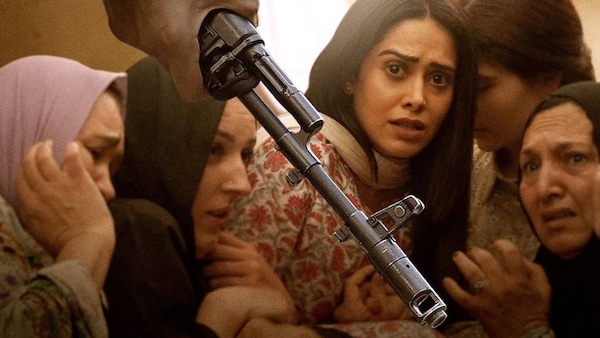Akelli Is Three Films In One, & Not A Single One Among Them Works
This is #CriticalMargin, where Ishita Sengupta gets contemplative over new Hindi films and shows. Here: Akelli.

Last Updated: 01.18 PM, Aug 25, 2023
ACTORS, I believe, can do miraculous things. They can elevate a moment, verbalise silences, take the written word and soar; they can also deflate a premise and squander its potential. This is why when a Ranbir Kapoor picks up a potted plant and slams it against his chest, performing a scene dunked in melodrama, the pain of his heartbreak still comes through. Or when Alia Bhatt makes a scene better just by her presence. This is also why Pranay Meshram’s survivor drama Akelli starring Nushrratt Bharuccha never really comes together.
There are, of course, more reasons. Meshram’s outing is a bloated survivor drama based in Iraq when ISIS seized Mosul in 2014. Given the times we are living in, it is easy to see the film as an offshoot of the burgeoning Middle-East genre where one religion is used as the face of all evil to underline the vulnerability of another. Earlier this year Sudipto Sen’s The Kerala Story milked this to great commercial success, freely sensationalising its central premise of women from Kerala being converted to Islam and inducted into the IS. In comparison, Meshram’s film sticks to the story. There is no hair-pulling propaganda as much, no sweeping statements about Islam, no threats about conversion. Sure, there are terrible people who raise their guns in the name of religion but it has the sense to depict them as who they are: extremists. This makes Akelli’s politics bearable, the film not so much.
For one, it unfolds as a frustrating mixture of an action thriller and survivor drama. One follows the other. Jyoti Arora (Bharuccha) is an Indian girl who works in a garment factory in Mosul. Being the sole breadwinner of the family, she had to relocate to the contentious country to earn money after losing her job. As the title suggests, the outing is about the way she escaped Iraq during the insurgency, aided by her fortitude and resilience.

Meshram roots the story well. There is an authenticity in the group of actors he assembles. But this gets undone with the leaps he takes in his depiction of Jyoti’s escape. In his intent of showcasing her strength, the filmmaker confuses courage with bravery, instinctiveness with deliberation. That we practically know nothing about her before she comes to Iraq makes it all the more implausible to comprehend her actions. Are they driven by compassion or was she always plucky? Does she have a skill we know nothing of or is it all adrenaline? As the plot unravels, she keeps getting into one crisis after another but conveniently overcomes everything and everyone. It is never convincing, not when Jyoti escapes hordes of dreaded IS men and not when she keeps evading them with no ammunition except a car. At every given point of time it is a helpless girl up against an army of men holding guns and one bullet keeping them apart.
But in Akelli’s preoccupation with highlighting Jyoti’s valiance, it packs as much adversity as possible without fine tuning the believability aspect. Thus, she escapes an IS camp, she also escapes from the house of an evil man who intended to give her up in the guise of helping her. One unmemorable set-pieces follows another till the film halts at a Kurdish camp. The idea is that this marks an end to her trials. Akelli disagrees, so starts another montage of smuggling her out of Iraq to India.
Most films are solely about this stretch, narrativising an impossible escape. Meshram treats this as a third act, hastily putting together the inclusion of government officials and some Argo. The result is Akelli feeling like three films in one, disjointed in terms of the level of the difficulty it scales up at every juncture. Meshram takes a shortcut here too by bringing back a character (a very pleasant Nishant Dahiya) who was absent from the story for the most part. That he happens to be where Jyoti is and offers to step up and offer help contributes to the easy shorthand the film keeps using.
Ultimately, however, a lot of Akelli not working comes down to the lead actor. Bharuccha is not particularly unwatchable but her lack of depth (for instance, after her horrid escape from the IS-infiltrated building, she eats food as though nothing has happened) disrupts the emotional continuity of the film. Her portrayal is always on the surface, spelling out things for us to understand. There is no urgency and for some bizarre reason her make-up remains on point amidst all the adversities. In the hands of a more physical actor, Akelli would have been a more watchable film. In the hands of Bharuccha, it is reduced to a lost opportunity.
(Disclaimer: The views expressed in this column are those of the author and do not necessarily reflect the official policy or position of OTTplay. The author is solely responsible for any claims arising out of the content of this column.)
